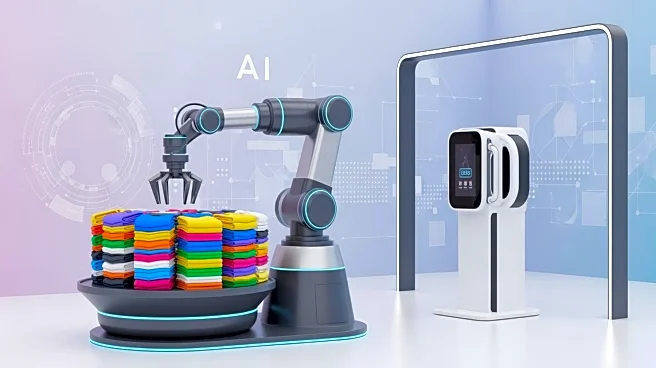What's Happening?
The Department of Industrial Technology (DoIT) of the Ministry of Economic Affairs (MOEA) has showcased 65 innovative technologies at the Taiwan Innotech Expo (TIE). These technologies span smart manufacturing, net zero sustainability, and healthcare.
Among the highlights is the AI Application Leap Program, aimed at accelerating AI adoption across key industries. The program involves partnerships with system integrators and research institutes to fuel Taiwan's innovation momentum. Additionally, the Taiwan Textile Research Institute (TTRI) has developed Multi-Spectral Imaging AI Recognition Technology for Blended Fibers, which can process 350-900 kilograms of waste textiles per hour, reducing post-processing costs. In healthcare, the Metal Industries Research & Development Centre (MIRDC) introduced new equipment for treating depression, designed to provide wider brain stimulation coverage and easier operation.
Why It's Important?
The unveiling of these technologies is significant for several reasons. The AI Application Leap Program is set to enhance Taiwan's position in the global technology landscape by accelerating AI integration in various industries. The textile recognition technology promises to improve recycling efficiency, which is crucial for sustainability efforts. The depression treatment equipment could revolutionize mental health care by simplifying operations and reducing treatment time, potentially improving patient outcomes. These advancements reflect Taiwan's commitment to innovation and its potential impact on global industries, particularly in technology and healthcare.
What's Next?
The next steps involve further development and implementation of these technologies. The AI Application Leap Program will continue to foster partnerships to expand AI adoption. The textile recognition technology is poised for international collaboration, particularly in the yoga apparel market. Clinical trials for the depression treatment equipment are underway, which could lead to broader adoption in healthcare settings. These developments may attract international interest and investment, further positioning Taiwan as a leader in technological innovation.
Beyond the Headlines
The broader implications of these technological advancements include ethical considerations in AI deployment, particularly regarding data privacy and security. The healthcare innovations may prompt discussions on accessibility and affordability of advanced treatments. Additionally, the focus on sustainability in textile recycling highlights the growing importance of environmental responsibility in manufacturing processes. These factors could influence policy decisions and industry standards globally.
















